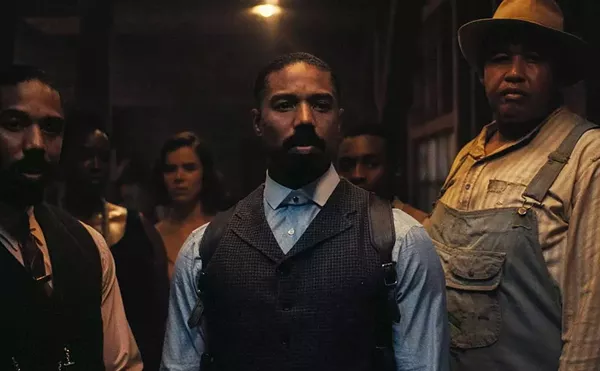
Audio By Carbonatix
[
{
"name": "GPT - Leaderboard - Inline - Content",
"component": "35519556",
"insertPoint": "5th",
"startingPoint": "3",
"requiredCountToDisplay": "3",
"maxInsertions": 100,
"adList": [
{
"adPreset": "LeaderboardInline"
}
]
}
]
Against a peaceful water-colored sky, a rustic ranch-type fence stands quiet as a crucifix. A half-dozen worn wooden chairs are scattered around bales of hay and painted crates. A black tar road is painted down the middle, as if to say there is somewhere to go from here. Part journalism and part theater, The Laramie Project is a live documentary drama that moves as if before a camera.
On a hay-strewn, American West set, eight actors playing about 60 characters present a collage of interview excerpts, recollections and re-enactments centered on the high-profile 1998 murder of a gay college student, Matthew Shepard, in Laramie, Wyoming. Through tales of its own inspiration and making, The Laramie Project excavates the pain, suffering and challenges to the human spirit experienced by Shepard, the people who knew him and the world that was touched by his story.
Members of the experimental New York-based Tectonic Theater Project and Venezuelan playwright-director Moises Kaufman (Gross Indecency: The Three Trials of Oscar Wilde) made several trips to Laramie after Shepard’s death. A collaborative effort to interview a full spectrum of the town’s residents — from a chain-smoking elderly bartender to the local parish priest — laid the groundwork for The Laramie Project. The script is based largely on excerpts from those interviews.
The Jewish Ensemble Theatre (JET) production of the award-winning play, which originally opened in March 2000 at the Denver Theatre Center before moving to off-Broadway in New York, is part of JET’s Campaign To Stop Hate. And it brings a poignant and unforgettable theater experience to the Detroit area.
The rapid-fire narrative style of The Laramie Project gives the three-act play the feel of a rolling train, an orderly system, cathartic and moving yet carefully mechanized. As if in a dramatic relay, the actors pass the baton of action among themselves, each introducing the next character. The voices of a local waitress, a Baptist minister’s wife, a judge, a reporter, a police detective, the doctor who announced Shepard’s death, Shepard’s father, both of Shepard’s killers and the bartender who last saw Shepard alive are among the many that call the theater audience back to Laramie.
The cyclist who discovered Shepard near death on the outskirts of town (Michelle Messmer) points out the exact spot where the young man lay on the ground, his hands still bound tightly to the fence with fine white rope. Her account doesn’t merely document the place and time of that terrible discovery, but haunts with a perplexing and helpless grief.
Among other characters, Messmer moves convincingly into the role of a witty, pragmatic Muslim feminist resident of Laramie, who speaks from an outsider’s point of view, and that of an inspired budding political activist who conceptualizes the “wall of angels” that surrounds a raging fundamentalist preacher, Fred Phelps (played by John Hawkinson). The preacher sports a red-white-and-blue jacket and cowboy hat, as he paces among the mourners outside Shepard’s funeral. He yells in a heavy Southern drawl, “You’re going to hell” as he waves two handmade signs, one that reads “Matthew Shepard Is Going To Hell” and the other that reads “God Hates Fags.” Hawkinson also slips into the voice of a soft-spoken Mormon home teacher, a bartender and a garrulous limousine chauffeur who recalls driving Shepard to Denver to visit a gay bar.
The police officer who first arrived at the site where Shepard’s body was found (Kelly Pino) had come in contact with the victim’s blood, which covered his head completely. Later, the officer was told Shepard was HIV-positive. JET’s artistic director, Evelyn Orbach, plays the officer’s mother, as well as the Baptist minister, another bartender and the emergency room doctor who treats both Shepard and, by chance, one of his killers, Aaron McKinney (Andrew Parker), on the same night.
The cast also includes Alan Ball, David Engelman and Maureen Dorington, who play seven or more roles each. With few exceptions, the cast takes on the constant character-shifting, unconventional structure, weighty emotional content and fast pacing of The Laramie Project with the necessary energy and precision, allowing the play to walk that broken yellow highway line that runs between activism and art with real verve and conviction.
Norene Cashen writes about performance for Metro Times. E-mail her at letters@metrotimes.com




